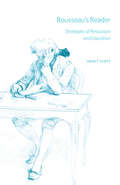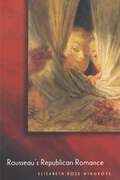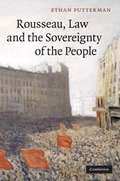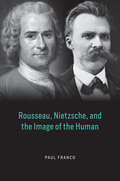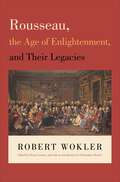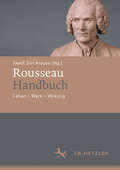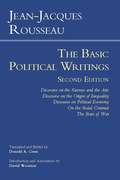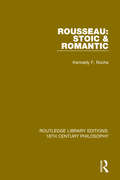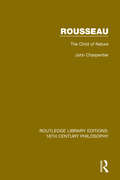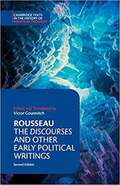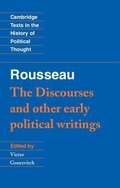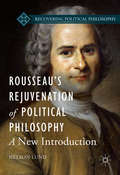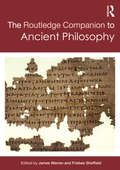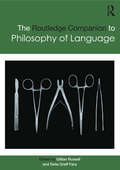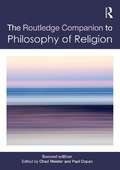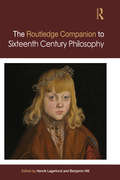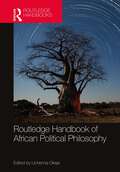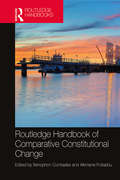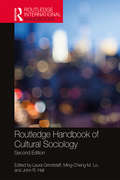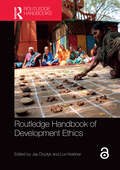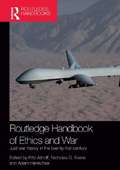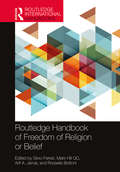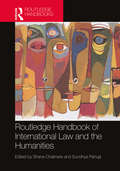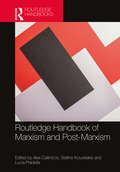- Table View
- List View
Rousseau's Reader: Strategies of Persuasion and Education
by John T. ScottOn his famous walk to Vincennes to visit the imprisoned Diderot, Rousseau had what he called an “illumination”—the realization that man was naturally good but becomes corrupted by the influence of society—a fundamental change in Rousseau’s perspective that would animate all of his subsequent works. At that moment, Rousseau “saw” something he had hitherto not seen, and he made it his mission to help his readers share that vision through an array of rhetorical and literary techniques. In Rousseau’s Reader, John T. Scott looks at the different strategies Rousseau used to engage and persuade the readers of his major philosophical works, including the Social Contract, Discourse on Inequality, and Emile. Considering choice of genre; textual structure; frontispieces and illustrations; shifting authorial and narrative voice; addresses to readers that alternately invite and challenge; apostrophe, metaphor, and other literary devices; and, of course, paradox, Scott explores how the form of Rousseau’s writing relates to the content of his thought and vice versa. Through this skillful interplay of form and content, Rousseau engages in a profoundly transformative dialogue with his readers. While most political philosophers have focused, understandably, on Rousseau’s ideas, Scott shows convincingly that the way he conveyed them is also of vital importance, especially given Rousseau’s enduring interest in education. Giving readers the key to Rousseau’s style, Scott offers fresh and original insights into the relationship between the substance of his thought and his literary and rhetorical techniques, which enhance our understanding of Rousseau’s project and the audiences he intended to reach.
Rousseau's Republican Romance
by Elizabeth Rose WingroveIn Rousseau's Republican Romance, Elizabeth Wingrove combines political theory and narrative analysis to argue that Rousseau's stories of sex and sexuality offer important insights into the paradoxes of democratic consent. She suggests that despite Rousseau's own protestations, "man" and "citizen" are not rival or contradictory ideals. Instead, they are deeply interdependent. Her provocative reconfiguration of republicanism introduces the concept of consensual nonconsensuality--a condition in which one wills the circumstances of one's own domination. This apparently paradoxical possibility appears at the center of Rousseau's republican polity and his romantic dyad: in both instances, the expression and satisfaction of desire entail a twin experience of domination and submission. Drawing on a wide variety of Rousseau's political and literary writings, Wingrove shows how consensual nonconsensuality organizes his representations of desire and identity. She demonstrates the inseparability of republicanism and accounts of heterosexuality in an analysis that emphasizes the sentimental and somatic aspects of citizenship. In Rousseau's texts, a politics of consent coincides with a performative politics of desire and of emotion. Wingrove concludes that understanding his strategies of democratic governance requires attending to his strategies of symbolization. Further, she suggests that any understanding of political practice requires attending to bodily practices.
Rousseau, Law and the Sovereignty of the People
by Ethan PuttermanTogether with Plato's Republic, Jean-Jacques Rousseau's Social Contract is regarded as one of the most original examples of utopian political engineering in the history of ideas. Similar to the Republic, Rousseau's masterwork is better known today for its author's idiosyncratic view of political justice than its lessons on lawmaking or governance in any concrete sense. Challenging this common view, Rousseau, Law and the Sovereignty of the People examines the Genevan's contributions as a legislator and builder of institutions, relating his major ideas to issues and debates in twenty-first century political science. Ethan Putterman explores how Rousseau's just state would actually operate, investigating how laws would be drafted, ratified and executed, arguing that the theory of the Social Contract is more pragmatic and populist than many scholars assume today.
Rousseau, Nietzsche, and the Image of the Human
by Paul FrancoRousseau and Nietzsche presented two of the most influential critiques of modern life and much can still be learned from their respective analyses of problems we still face. In Rousseau, Nietzsche, and the Image of the Human, Paul Franco examines the relationship between Jean-Jacques Rousseau and Friedrich Nietzsche, arguably the two most influential shapers and explorers of the moral and cultural imagination of late modernity. Both thinkers leveled radical critiques of modern life, but those critiques differed in important respects. Whereas Rousseau focused on the growing inequality of modern society and the hypocrisy, self-division, and loss of civic virtue it spawned, Nietzsche decried the democratic equality he identified with Rousseau and the loss of individual and cultural greatness it entailed. Franco argues, however, that Rousseau and Nietzsche are more than mere critics; they both put forward powerful alternative visions of how we ought to live. Franco focuses specifically on their views of the self and its realization, their understandings of women and the relation between the sexes, and their speculative conceptions of politics. While there are many similarities in their positive visions, Franco argues that it is the differences between them from which we have most to learn.
Rousseau, the Age of Enlightenment, and Their Legacies
by Robert WoklerRobert Wokler was one of the world's leading experts on Rousseau and the Enlightenment, but some of his best work was published in the form of widely scattered and difficult-to-find essays. This book collects for the first time a representative selection of his most important essays on Rousseau and the legacy of Enlightenment political thought. These essays concern many of the great themes of the age, including liberty, equality and the origins of revolution. But they also address a number of less prominent debates, including those over cosmopolitanism, the nature and social role of music and the origins of the human sciences in the Enlightenment controversy over the relationship between humans and the great apes. These essays also explore Rousseau's relationships to Rameau, Pufendorf, Voltaire and Marx; reflect on the work of important earlier scholars of the Enlightenment, including Ernst Cassirer and Isaiah Berlin; and examine the influence of the Enlightenment on the twentieth century. One of the central themes of the book is a defense of the Enlightenment against the common charge that it bears responsibility for the Terror of the French Revolution, the totalitarian regimes of the twentieth-century and the Holocaust.
Rousseau-Handbuch: Leben – Werk – Wirkung
by Skadi Siiri KrauseJean-Jacques Rousseau (1712–1778) ist zweifellos einer der bedeutendsten und vielseitigsten Theoretiker der Aufklärung. Die Wirkung seines politischen, soziologischen, moralphilosophischen, pädagogischen, linguistischen, botanischen und kompositorischen Werks erstreckte sich im 18. Jahrhundert über ganz Europa und Nordamerika. Und diese Rezeption, die längst nicht mehr an bestimmte Länder gebunden ist, hält bis heute an. Dabei zeigt sich, dass Rousseaus Denken noch immer nicht in seiner ganzen Breite erschlossen ist. Gerade in der politischen Theorie ist häufig eine Verengung auf wenige, immer wieder interpretierte Texte und Textpassagen zu beobachten. Dem will das Handbuch entgegenwirken, indem es nicht nur die Fülle von Rousseaus Werk und seine vielfältigen Bezüge vorstellt, sondern auch neuere Forschungstendenzen skizziert, unterschiedliche Deutungsmuster präsentiert und Fragen nach Kohärenz und Widersprüchen, aber auch nach der Aktualität der Schriften des Denkers aufwirft.
Rousseau: Discourse on the Sciences and the Arts, Discourse on the Origin of Inequality, Discourse on Political Economy, On the Social Contract, The State of War (Hackett Classics)
by Jean-Jacques Rousseau Donald A. Cress David WoottonThis substantially revised new edition of Rousseau: The Basic Political Writings features a brilliant new Introduction by David Wootton, a revision by Donald A. Cress of his own 1987 translation of Rousseau's most important political writings, and the addition of Cress' new translation of Rousseau's State of ?War. New footnotes, headnotes, and a chronology by David Wootton provide expert guidance to first-time readers of the texts.
Rousseau: Stoic & Romantic (Routledge Library Editions: 18th Century Philosophy #15)
by Kennedy F. RocheThis book, first published in 1974, studies the similarities between Rousseau’s thought and that of the Stoics, examining Rousseau’s ideas on man, society, the state and government. It makes close reference to Rousseau’s writings, and to the works of Seneca and other Stoics, presenting an opportunity to really come to grips with a complex and often contradictory mind.
Rousseau: The Child of Nature (Routledge Library Editions: 18th Century Philosophy #16)
by John CharpentierThis book, first published in 1931, provides a valuable account of Rousseau’s early years, giving an insight into his later philosophies, as well as showing the development of his thought.
Rousseau: The Discourses And Other Early Political Writings (Cambridge Texts In The History Of Political Thought)
by Jean-Jacques Rousseau Victor GourevitchA comprehensive and authoritative anthology of Rousseau's important early political writings in faithful English translations. This volume includes the Discourse on the Sciences and Arts and the Discourse on the Origin and the Foundations of Inequality among Men - the so-called First and Second Discourses - together with Rousseau's extensive Replies to critics of these Discourses; the Essay on the Origin of Languages; the Letter to Voltaire on Providence; as well as several minor but illuminating writings - the Discourse on Heroic Virtue and the essay Idea of the Method in the Composition of a Book. In these as well as in his later writings, Rousseau probes the very premises of modern thought. His influence was wide-reaching from the very first, and it has continued to grow since his death. The American and the French Revolutions were profoundly affected by his thought, as were Romanticism and Idealism. This new edition features up-to-date translations, an expanded introduction, and an extensive editorial apparatus designed to assist students at every level access these seminal texts.
Rousseau: The Discourses and Other Early Political Writings
by Jean-Jacques Rousseau Victor GourevitchThe work of Jean-Jacques Rousseau is presented in two volumes, together forming a comprehensive anthology of Rousseau's political writings in English. This second volume contains the earlier writings such as the First and Second Discourses, the publication of which signalled the power and challenge of Rousseau's thinking. Rousseau's influence was wide reaching and has continued to grow since his death: major landmarks in world history, such as the American and French Revolutions, were profoundly affected by Rousseau's writing, as were cultural and intellectual movements such as Romanticism and Idealism. This volume, like its successor, contains a comprehensive introduction, chronology and guide to further reading and will enable students to obtain a full understanding of the writings of one of the world's greatest thinkers.
Rousseau’s Rejuvenation of Political Philosophy
by Nelson LundThis book reads Jean-Jacques Rousseau with a view toward deepening our understanding of many political issues alive today, including the place of women in society, the viability of traditional family structures, the role of religion and religious freedom in nations that are becoming ever more secular, and the proper conduct of American constitutional government. Rousseau has been among the most influential modern philosophers, and among the most misunderstood. The first great philosophic critic of the Enlightenment, he sought to revive political philosophy as it was practiced by Plato, and to make it useful in the modern world. His understanding of politics rests on deep and often prescient reflections about the nature of the human soul and the relationship between our animal origins and the achievements of civilization. This book demonstrates that the implications Rousseau drew from those reflections continue to deserve serious attention.
Routledge Companion to Ancient Philosophy (Routledge Philosophy Companions)
by James Warren Frisbee SheffieldThe Routledge Companion to Ancient Philosophy is a collection of new essays on the philosophy and philosophers of the ancient Greek and Roman worlds. Written by a cast of international scholars, it covers the full range of ancient philosophy from the sixth century BC to the sixth century AD and beyond. There are dedicated discussions of the major areas of the philosophy of Plato and Aristotle together with accounts of their predecessors and successors. The contributors also address various problems of interpretation and method, highlighting the particular demands and interest of working with ancient philosophical texts. All original texts discussed are translated into English.
Routledge Companion to Philosophy of Language (Routledge Philosophy Companions)
by Gillian Russell Delia Graff FaraPhilosophy of language is the branch of philosophy that examines the nature of meaning, the relationship of language to reality, and the ways in which we use, learn, and understand language. The Routledge Companion to Philosophy of Language provides a comprehensive and up-to-date survey of the field, charting its key ideas and movements, and addressing contemporary research and enduring questions in the philosophy of language. Unique to this Companion is clear coverage of research from the related disciplines of formal logic and linguistics, and discussion of the applications in metaphysics, epistemology, ethics and philosophy of mind. Organized thematically, the Companion is divided into seven sections: Core Topics; Foundations of Semantics; Parts of Speech; Methodology; Logic for Philosophers of Language; Philosophy of Language for the Rest of Philosophy; and Historical Perspectives. Comprised of 70 never-before-published essays from leading scholars--including Sally Haslanger, Jeffrey King, Sally McConnell-Ginet, Rae Langton, Kit Fine, John MacFarlane, Jeff Pelletier, Scott Soames, Jason Stanley, Stephen Stich and Zoltan Gendler Szabo--the Routledge Companion to Philosophy of Language promises to be the most comprehensive and authoritative resource for students and scholars alike.
Routledge Companion to Philosophy of Religion
by Chad Meister Paul CopanThe Routledge Companion to Philosophy of Religion, Second edition is an indispensable guide and reference source to the major themes, movements, debates and topics in philosophy of religion. Considerably expanded for the second edition, over seventy entries from a team of renowned international contributors are organized into nine clear parts: philosophical issues in world religions key figures in philosophy of religion religious diversity the theistic conception of God arguments for the existence of God arguments against the existence of God philosophical theology Christian theism recent topics in philosophy of religion. Covering key world religions including Hinduism, Buddhism and Islam, and key figures such as Augustine, Aquinas and Kierkegaard, the Companion explores the central topics in theism such as the ontological, cosmological and teleological arguments for God’s existence. Three final parts consider Catholicism, Protestantism, Eastern orthodoxy and current debates including phenomenology, reformed epistemology, religious experience, and religion and science, making the Companion as a whole essential reading for students of philosophy or religion, and suitable for anyone coming to the subject for the first time. This second edition includes new chapters on Blaise Pascal, Baruch Spinoza, Interreligious Dialogue, Death and the Afterlife, Incorporeality, Religion and Global Ethics, New Religious Movements, Religion and the Environment, and Religion and Film.
Routledge Companion to Sixteenth Century Philosophy (Routledge Philosophy Companions Ser.)
by Henrik Lagerlund Benjamin HillSixteenth century philosophy was a unique synthesis of several philosophical frameworks, a blend of old and new, including but not limited to Scholasticism, Humanism, Neo-Thomism, Aristotelianism, and Stoicism. Unlike most overviews of this period, The Routledge Companion to Sixteenth Century Philosophy?does not simplify this colorful era by applying some traditional dichotomies, such as the misleading line once drawn between scholasticism and humanism. Instead, the Companion closely covers an astonishingly diverse set of topics: philosophical methodologies of the time, the importance of the discovery of the new world, the rise of classical scholarship, trends in logic and logical theory, Nominalism, Averroism, the Jesuits, the Reformation, Neo-stoicism, the soul’s immortality, skepticism, the philosophies of language and science and politics, cosmology, the nature of the understanding, causality, ethics, freedom of the will, natural law, the emergence of the individual in society, the nature of wisdom, and the love of god. Throughout, the?Companion?seeks not to compartmentalize these philosophical matters, but instead to show that close attention paid to their continuity may help reveal both the diversity and the profound coherence of the philosophies that emerged in the sixteenth century. The Companion’s 27 chapters are published here for the first time, and written by an international team of scholars, and accessible for both students and researchers.
Routledge Handbook of African Political Philosophy
by Uchenna OkejaThe Routledge Handbook of African Political Philosophy showcases and develops the arguments propounded by African philosophers on political problems, bringing together experts from around the world to chart current and future research trends. Africa’s recent history has been shaped by the experiences of colonization, anti-colonial struggle, and postcolonial self-rule, so it is perhaps not surprising that political questions are also central to African philosophy. This exciting new handbook provides insights into the foundations, virtues, vices, controversies, and key topics to be found within African political philosophy, concluding by considering how it connects with other traditions of political philosophy. In doing so, this book provides important fresh perspectives that help us to gain a richer understanding of the challenges of coexistence in society and governance not just in Africa, but around the world. This book will be an important resource for researchers and students across the fields of Political Philosophy, Political Science, International Relations, and African Studies.
Routledge Handbook of African Political Philosophy
by Uchenna OkejaThe Routledge Handbook of African Political Philosophy showcases and develops the arguments propounded by African philosophers on political problems, bringing together experts from around the world to chart current and future research trends. This exciting new handbook provides insights on the foundations, virtues, vices, controversies, and key topics to be found within African political philosophy, concluding by considering how it connects with other traditions of political philosophy. The book provides important fresh perspectives which help us to a richer understanding of the challenges of co-existence in society and governance not just in Africa, but around the world.
Routledge Handbook of Comparative Constitutional Change
by Xenophon ContiadesComparative constitutional change has recently emerged as a distinct field in the study of constitutional law. It is the study of the way constitutions change through formal and informal mechanisms, including amendment, replacement, total and partial revision, adaptation, interpretation, disuse and revolution. The shift of focus from constitution-making to constitutional change makes sense, since amendment power is the means used to refurbish constitutions in established democracies, enhance their adaptation capacity and boost their efficacy. Adversely, constitutional change is also the basic apparatus used to orchestrate constitutional backslide as the erosion of liberal democracies and democratic regression is increasingly affected through legal channels of constitutional change. Routledge Handbook of Comparative Constitutional Change provides a comprehensive reference tool for all those working in the field and a thorough landscape of all theoretical and practical aspects of the topic. Coherence from this aspect does not suggest a common view, as the chapters address different topics, but reinforces the establishment of comparative constitutional change as a distinct field. The book brings together the most respected scholars working in the field, and presents a genuine contribution to comparative constitutional studies, comparative public law, political science and constitutional history.
Routledge Handbook of Cultural Sociology: 2nd Edition (Routledge International Handbooks)
by John R. Hall Laura Grindstaff Ming-Cheng M. LoThe thoroughly revised and updated second edition of the Routledge Handbook of Cultural Sociology provides an unparalleled overview of sociological and related scholarship on the complex relations of culture to social structures and everyday life. With 70 essays written by scholars from around the world, the book brings diverse approaches into dialogue, charting new pathways for understanding culture in our global era. Short, accessible chapters by contributing authors address classic questions, emergent issues, and new scholarship on topics ranging from cultural and social theory to politics and the state, social stratification, identity, community, aesthetics, and social and cultural movements. In addition, contributors explore developments central to the constitution and reproduction of culture, such as power, technology, and the organization of work. This handbook is essential reading for undergraduate and postgraduate students interested in a wide range of subfields within sociology, as well as cultural studies, media and communication, and postcolonial theory.
Routledge Handbook of Development Ethics
by Lori Keleher Jay DrydykThe Routledge Handbook of Development Ethics provides readers with insight into the central questions of development ethics, the main approaches to answering them, and areas for future research. Over the past seventy years, it has been argued and increasingly accepted that worthwhile development cannot be reduced to economic growth. Rather, a number of other goals must be realised: • Enhancement of people's well-being • Equitable sharing in benefits of development • Empowerment to participate freely in development • Environmental sustainability • Promotion of human rights • Promotion of cultural freedom, consistent with human rights • Responsible conduct, including integrity over corruption Agreement that these are essential goals has also been accompanied by disagreements about how to conceptualize or apply them in different cases or contexts. Using these seven goals as an organizing principle, this handbook presents different approaches to achieving each one, drawing on academic literature, policy documents and practitioner experience. This international and multi-disciplinary handbook will be of great interest to development policy makers and program workers, students and scholars in development studies, public policy, international studies, applied ethics and other related disciplines.
Routledge Handbook of Ethics and War: Just War Theory in the 21st Century (Routledge International Handbooks)
by Fritz Allhoff Nicholas G. Evans Adam HenschkeThis new Handbook offers a comprehensive overview of contemporary extensions and alternatives to the just war tradition in the field of the ethics of war. The modern history of just war has typically assumed the primacy of four particular elements: jus ad bellum, jus in bello, the state actor, and the solider. This book will put these four elements under close scrutiny, and will explore how they fare given the following challenges: • What role do the traditional elements of jus ad bellum and jus in bello—and the constituent principles that follow from this distinction—play in modern warfare? Do they adequately account for a normative theory of war? • What is the role of the state in warfare? Is it or should it be the primary actor in just war theory? • Can a just war be understood simply as a response to territorial aggression between state actors, or should other actions be accommodated under legitimate recourse to armed conflict? • Is the idea of combatant qua state-employed soldier a valid ethical characterization of actors in modern warfare? • What role does the technological backdrop of modern warfare play in understanding and realizing just war theories?Over the course of three key sections, the contributors examine these challenges to the just war tradition in a way that invigorates existing discussions and generates new debate on topical and prospective issues in just war theory. This book will be of great interest to students of just war theory, war and ethics, peace and conflict studies, philosophy and security studies.
Routledge Handbook of Freedom of Religion or Belief (Routledge International Handbooks)
by Rossella Bottoni Silvio Ferrari Mark Hill Arif A. JamalFreedom of religion is an issue of universal interest and scope. However, in the last two centuries at least, the philosophical, religious and legal terms of the question have been largely defined in the West. In an increasingly global world, widening our knowledge of this right’s roots in different cultural and legal systems becomes a priority. This Handbook seeks to attain this goal through a better understanding of the historical roots and expressions of the right to freedom of religion on the one hand and, on the other, of its theological background in different religious traditions. History and theology provide the setting for the analysis of the politics of freedom of religion, that is, how this right is used in the context of the dialogue/confrontation between countries placed in different cultural regions of the world, and of the legal strategies and tools that have been developed and are employed to protect and foster the right to freedom of religion. Behind these legal and political strategies, there is an ongoing debate about the nature of this right, whose main features are explored in the final section. Global, historical and interdisciplinary in approach, this book studies the new relevance of freedom of religion worldwide and develops suitable categories to analyze and understand the role that freedom of religion can play in managing religious and cultural diversity in our societies. Authored by experts, through the contributions collected in these chapters, scholars and students will be able to broaden and deepen their knowledge of the right to freedom of religion and to develop the ability to go beyond the borders of the different cultural environments in which this right took shape and developed.
Routledge Handbook of International Law and the Humanities
by Shane Chalmers; Sundhya PahujaThis Handbook brings together 40 of the world’s leading scholars and rising stars who study international law from disciplines in the humanities – from history to literature, philosophy to the visual arts – to showcase the distinctive contributions that this field has made to the study of international law over the past two decades. Including authors from Australia, Canada, Europe, India, South Africa, the UK and the USA, all the contributors engage the question of what is distinctive, and critical, about the work that has been done and that continues to be done in the field of ‘international law and the humanities’. For many of these authors, answering this question involves reflecting on the work they themselves have been contributing to this path-breaking field since its inception at the end of the twentieth century. For others, it involves offering models of the new work they are carrying out, or else reflecting on the future directions of a field that has now taken its place as one of the most important sites for the study of international legal practice and theory. Each of the book’s six parts foregrounds a different element, or cluster of elements, of international law and the humanities, from an attention to the office, conduct and training of the jurist and jurisprudent (Part 1); to scholarly craft and technique (Part 2); to questions of authority and responsibility (Part 3); history and historiography (Part 4); plurality and community (Part 5); as well as the challenge of thinking, and rethinking, international legal concepts for our times (Part 6). Outlining new ways of imagining, and doing, international law at a moment in time when original, critical thought and practice is more necessary than ever, this Handbook will be essential for scholars, students and practitioners in international law, international relations, as well as in law and the humanities more generally.
Routledge Handbook of Marxism and Post-Marxism
by Alex Callinicos; Stathis Kouvelakis; Lucia PradellaIn the past two decades, Marxism has enjoyed a revitalization as a research program and a growth in its audience. This renaissance is connected to the revival of anti-capitalist contestation since the Seattle protests in 1999 and the impact of the global economic and financial crisis in 2007–8. It intersects with the emergence of Post-Marxism since the 1980s represented by thinkers such as Jürgen Habermas, Chantal Mouffe, Ranajit Guha and Alain Badiou. This handbook explores the development of Marxism and Post-Marxism, setting them in dialogue against a truly global backdrop. Transcending the disciplinary boundaries between philosophy, economics, politics and history, an international range of expert contributors guide the reader through the main varieties and preoccupations of Marxism and Post-Marxism. Through a series of framing and illustrative essays, readers will explore these traditions, starting from Marx and Engels themselves, through the thinkers of the Second and Third Internationals (Rosa Luxemburg, Lenin and Trotsky, among others), the Tricontinental, and Subaltern and Post-Colonial Studies, to more contemporary figures such as Huey Newton, Fredric Jameson, Judith Butler, Immanuel Wallerstein and Samir Amin. The Routledge Handbook of Marxism and Post-Marxism will be of interest to scholars and researchers of philosophy, cultural studies and theory, sociology, political economics and several areas of political science, including political theory, Marxism, political ideologies and critical theory.
